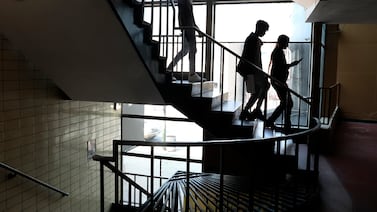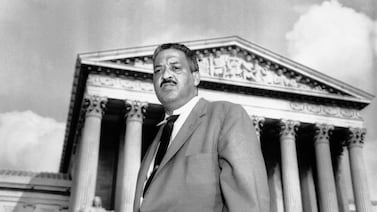Schools can use creative scheduling to comply with the Tennessee governor’s order that allows families to opt out of masks in schools and still protect the rights and health of immunocompromised students, argued attorney Jim Newsome during a court hearing on Thursday.
Newsome, attorney for defendant Gov. Bill Lee, was among the parties presenting their cases in a Memphis courtroom before U.S. District Judge Sheryl Lipman of Tennessee’s Western District. Lipman will now decide if a temporary injunction is appropriate to continue to block the governor’s order, or if the court should reinstate it.
The judge issued no ruling on Thursday, but a temporary restraining order issued on Friday remains in effect until Sept. 17. The temporary injunction, if granted, would remain in effect while the trial is pending or until overturned in an appeals court.
Three Shelby County parents of students with disabilities filed the class action lawsuit on Aug. 27. The suit says allowing students to circumvent a county masks-in-schools mandate violates the Americans with Disabilities Act because it jeopardizes the health and education of their medically vulnerable children who are at higher risks for severe complications from COVID. Parents in Florida have filed a similar lawsuit, and the Biden administration also is investigating related issues in Tennessee and other states.
Newsome argued that the lawsuit was premature because the parents had not exhausted the appeals available through the Individuals with Disabilities Education Act. Schools also should consider using gyms as classrooms to allow more social distancing or make special class schedules for students with disabilities to help limit their contact with their maskless peers, he said.
Brice Timmons of Donati Law, who is representing the plaintiffs, scoffed at such ideas after court.
“I thought that separate but equal was over but apparently we’re going to argue that again for students with disabilities,” he said.
“That is completely antithetical to the central purpose of the Americans with Disabilities Act, which is to integrate persons with disabilities into the mainstream of American society,” he said.
Lawyers for Shelby County, who also filed a lawsuit against the governor over the executive order, supported the plaintiffs in court on Thursday.
The only witness called on Thursday was Theresa Nicholls, assistant commissioner for special populations at the Tennessee Department of Education.
Nicholls, a defense witness and the head of special education services for the state, walked through the extensive accommodations that the state has made to help students with disabilities access a “free appropriate public education” since the beginning of the pandemic.
On cross-examination, the plaintiff’s lawyer asked if Lee consulted with her before issuing the order, given her expertise on disability services.
“No,” she replied.
In Thursday’s hearing, attorneys and the judge also spoke to the effectiveness of masks, with the plaintiff’s attorneys echoing the sentiments of a brief filed in the case by the state and national chapters of the American Academy of Pediatrics.
The statement said, “The AAP’s strong recommendation of universal masking for students, teachers, and support staff in school has remained consistent from the beginning — because masks are a safe, effective, and critical infection control measure.”
The statement also quoted one of Lee’s statements on masking.
“In short, the science squarely backs up Gov. Lee’s advice that “If you want to protect your kid from the [COVID] virus or from quarantine, the best way to do that is to have your kid in school with a mask,” it said.
Lee, who is vaccinated and often wears a mask, has given mixed messages on masks for Tennessee schoolchildren. In interviews, press conferences, and social media posts, he has said both that masks are unnecessary in school and necessary for safety. However, Lee has remained steadfast that parents should make that choice for their children, not a county or school district.
The issue of masks in schools has been hotly debated nationwide, but especially in the Republican stronghold of the South where some conservatives argue that masks are an intrusion on personal liberties.
At the end of Thursday’s hearing, an anti-mask protester approached plaintiff attorney Bryce Ashby and called him a bad lawyer for his position in the case.
After the hearing, Ashby’s colleague addressed the outburst, political climate, and a threat made against one of his clients. He said he’s worried about his clients’ safety but added that he has already witnessed their toughness.
“Parents of kids with disabilities are some of the strongest people I’ve ever met,” he said. “They have to be tough. They have to constantly advocate for their children’s needs.”








